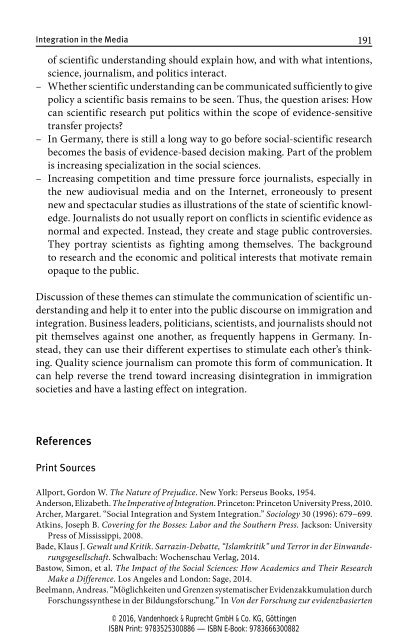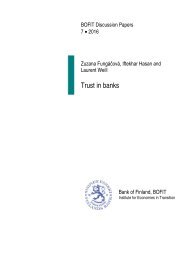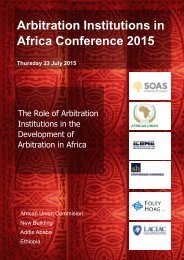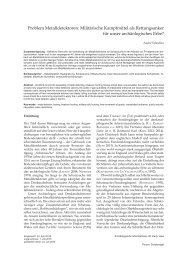Media and Minorities
9783666300882_ruhrmann_media_ebook_034247
9783666300882_ruhrmann_media_ebook_034247
Create successful ePaper yourself
Turn your PDF publications into a flip-book with our unique Google optimized e-Paper software.
Integration in the <strong>Media</strong> 191<br />
of scientific underst<strong>and</strong>ing should explain how, <strong>and</strong> with what intentions,<br />
science, journalism, <strong>and</strong> politics interact.<br />
– Whether scientific underst<strong>and</strong>ing can be communicated sufficiently to give<br />
policy a scientific basis remains to be seen. Thus, the question arises: How<br />
can scientific research put politics within the scope of evidence-sensitive<br />
transfer projects?<br />
– In Germany, there is still a long way to go before social-scientific research<br />
becomes the basis of evidence-based decision making. Part of the problem<br />
is increasing specialization in the social sciences.<br />
– Increasing competition <strong>and</strong> time pressure force journalists, especially in<br />
the new audiovisual media <strong>and</strong> on the Internet, erroneously to present<br />
new <strong>and</strong> spectacular studies as illustrations of the state of scientific knowledge.<br />
Journalists do not usually report on conflicts in scientific evidence as<br />
normal <strong>and</strong> expected. Instead, they create <strong>and</strong> stage public controversies.<br />
They portray scientists as fighting among themselves. The background<br />
to research <strong>and</strong> the economic <strong>and</strong> political interests that motivate remain<br />
opaque to the public.<br />
Discussion of these themes can stimulate the communication of scientific underst<strong>and</strong>ing<br />
<strong>and</strong> help it to enter into the public discourse on immigration <strong>and</strong><br />
integration. Business leaders, politicians, scientists, <strong>and</strong> journalists should not<br />
pit themselves against one another, as frequently happens in Germany. Instead,<br />
they can use their different expertises to stimulate each other’s thinking.<br />
Quality science journalism can promote this form of communication. It<br />
can help reverse the trend toward increasing disintegration in immigration<br />
societies <strong>and</strong> have a lasting effect on integration.<br />
References<br />
Print Sources<br />
Allport, Gordon W. The Nature of Prejudice. New York: Perseus Books, 1954.<br />
Anderson, Elizabeth. The Imperative of Integration. Princeton: Princeton University Press, 2010.<br />
Archer, Margaret. “Social Integration <strong>and</strong> System Integration.” Sociology 30 (1996): 679–699.<br />
Atkins, Joseph B. Covering for the Bosses: Labor <strong>and</strong> the Southern Press. Jackson: University<br />
Press of Mississippi, 2008.<br />
Bade, Klaus J. Gewalt und Kritik. Sarrazin-Debatte, “Islamkritik” und Terror in der Einw<strong>and</strong>erungsgesellschaft.<br />
Schwalbach: Wochenschau Verlag, 2014.<br />
Bastow, Simon, et al. The Impact of the Social Sciences: How Academics <strong>and</strong> Their Research<br />
Make a Difference. Los Angeles <strong>and</strong> London: Sage, 2014.<br />
Beelmann, Andreas. “Möglichkeiten und Grenzen systematischer Evidenzakkumulation durch<br />
Forschungssynthese in der Bildungsforschung.” In Von der Forschung zur evidenz basierten<br />
© 2016, V<strong>and</strong>enhoeck & Ruprecht GmbH & Co. KG, Göttingen<br />
ISBN Print: 9783525300886 — ISBN E-Book: 9783666300882







